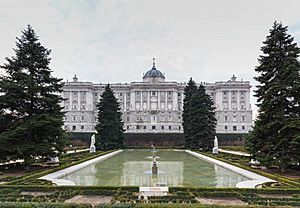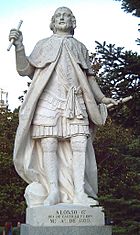Sabatini Gardens facts for kids
Quick facts for kids Sabatini Gardens |
|
|---|---|

Sabatini Gardens, with the Royal Palace.
|
|
| Lua error in Module:Location_map at line 420: attempt to index field 'wikibase' (a nil value). |

The Sabatini Gardens (in Spanish: Jardines de Sabatini) are beautiful gardens. They are located next to the Royal Palace in Madrid, Spain. King Juan Carlos I opened them to the public in 1978.
These gardens are named after Francesco Sabatini (1722–1797). He was an Italian architect from the 1700s. Sabatini designed many parts of the palace. He also designed the royal stables, which used to be where the gardens are now.
Contents
History of Sabatini Gardens
The idea for the gardens began in 1933. Workers started clearing the old stable buildings. The construction of the gardens then began. However, they were not finished until the late 1970s.
Design and Features of the Gardens
The Sabatini Gardens have a formal Neoclassic style. This means they are designed in a very orderly way. You will see neatly trimmed hedges. These hedges form symmetric, or balanced, geometric patterns.
The gardens also feature a large pool. There are many statues and fountains. The trees are also planted in a symmetrical shape. The statues show different Spanish kings. They were not originally made for a garden. Instead, they were meant for the palace itself.
The gardens offer a peaceful spot. From here, you can enjoy a great view of the Royal Palace.
Terraces of Sabatini Gardens
The Sabatini Gardens are divided into three main levels, called terraces.
First Terrace Features
The first terrace has a very balanced design. In its center is a sheet of water. This water acts like a mirror. It reflects the beautiful surroundings.
Second Terrace Views
The second terrace is located above the first one. From here, you can see the entire front of the Royal Palace. This terrace also has a pine grove. This grove stretches towards the Cuesta de San Vicente. This is a street with steps leading into the Sabatini Gardens.
Third Terrace Location
To the east of the second terrace, you will find the third terrace.
See also
 In Spanish: Jardines de Sabatini para niños
In Spanish: Jardines de Sabatini para niños
 | Audre Lorde |
 | John Berry Meachum |
 | Ferdinand Lee Barnett |

